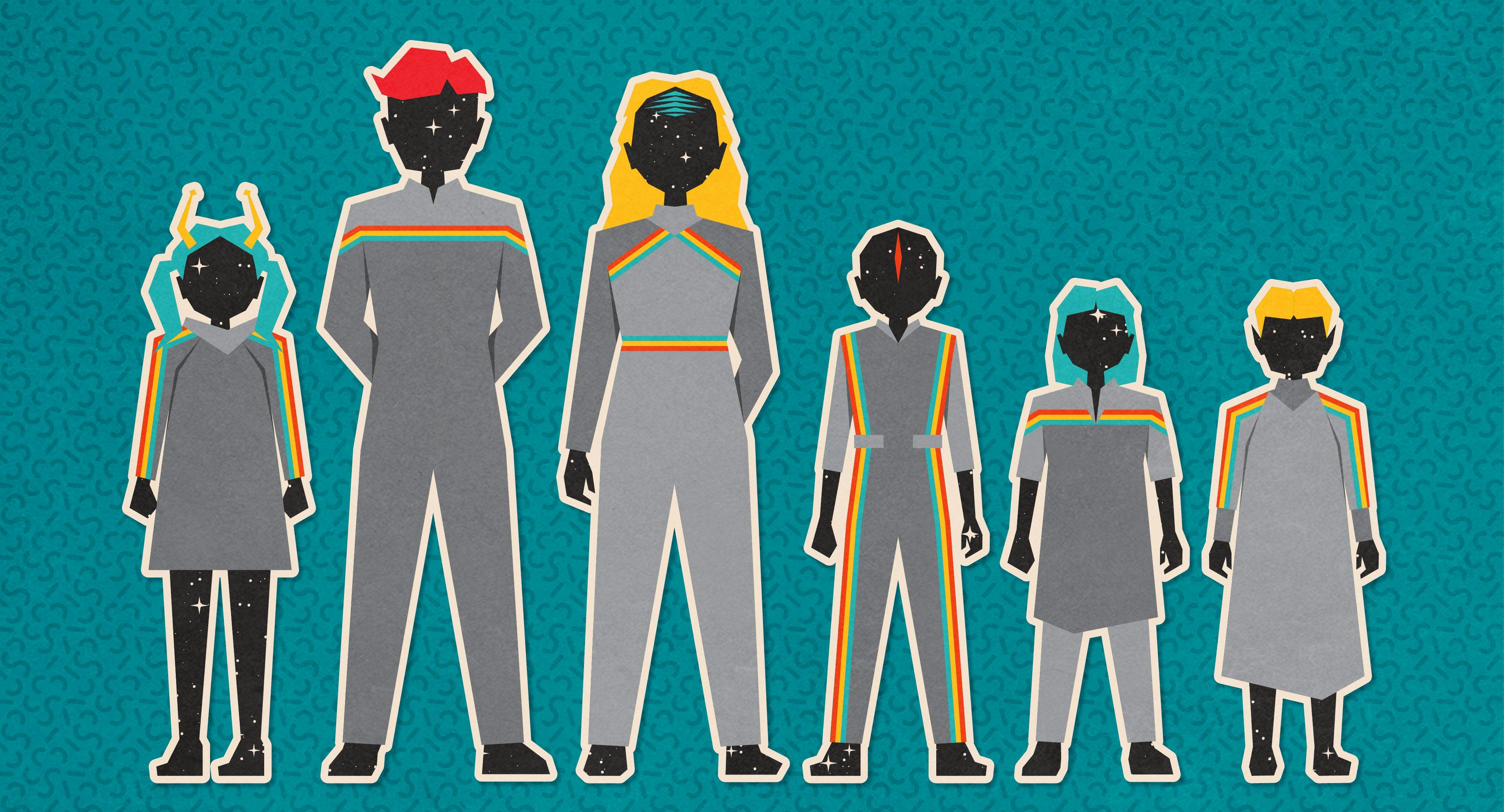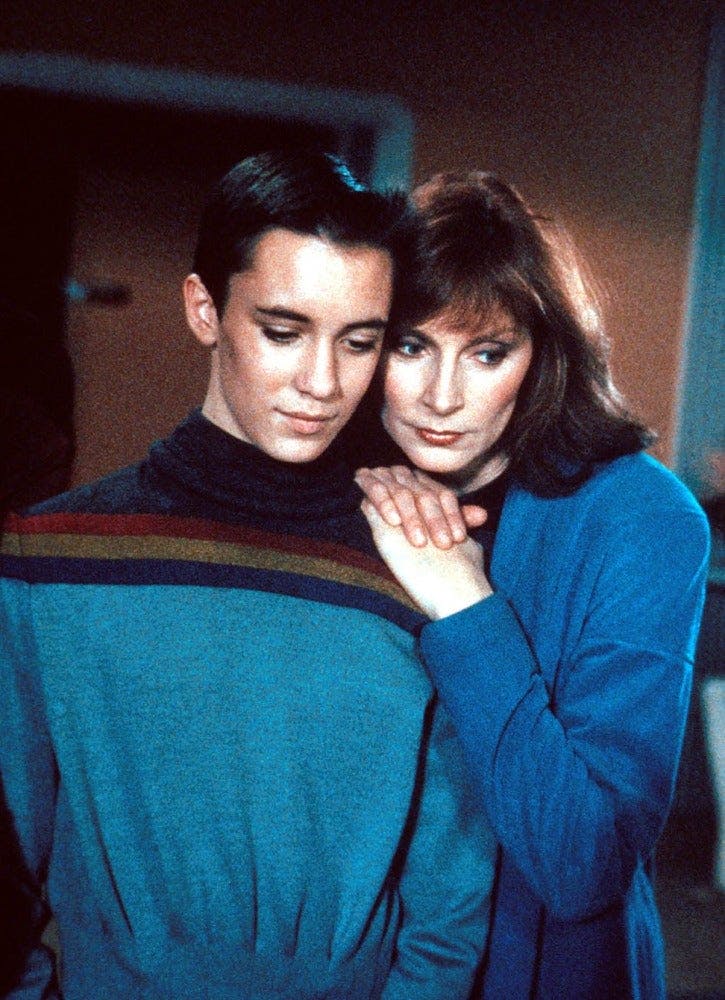Published Jan 29, 2021
Starfleet's Brats
How Starfleet families reflect our world's military brats

StarTrek.com
One of the questions I dread the most is “Where are you from?” It’s a question Wesley Crusher, Jake Sisko, Molly O’Brien and Naomi Wildman can’t answer in a straightforward way, either. They’re all brats like me — a term the children of servicemembers embrace to describe their unusual upbringing. It may seem like an insult to call a child a ‘brat,’ but it’s a label worn with pride by real life military children.
In the first episode of Deep Space Nine, Benjamin Sisko speaks to Jean-Luc Picard about his assignment as the station’s new commander.
PICARD: I have been made aware by Starfleet of your objections to this assignment. I would have thought that after three years spent at the Utopia Planitia yards, that you would be ready for a change.
SISKO: I have a son that I'm raising alone, Captain. This is not the ideal environment.
PICARD: Unfortunately as Starfleet officers, we do not always have the luxury to serve in an ideal environment.
Star Trek: Deep Space Nine — I Have a Son That I'm Raising Alone
As anyone who serves knows, you go where you’re ordered, and Starfleet officers are no exception. This has a profound effect on the families of servicepeople, like Ben’s son, Jake. In “Emissary,” father and son have just been posted — a word that enters a brat’s vocabulary at an early age. To be posted is to have your family sent somewhere, sometimes far away, often without your input.
When I was younger than Jake, we were posted as far as you could go and still be in the same country. We moved from New Brunswick on the East Coast, to an archipelago in the North Pacific called Haida Gwaii. So when I saw Jake struggling to adjust to his new life, I knew exactly what he was feeling.
The Sisko family aren’t the only ones aboard DS9 we see adapting to postings. The O’Briens are in many ways, the quintessential military family. Molly was born aboard the Enterprise and, at the start of DS9, was experiencing her first posting. Like many military spouses, Keiko struggled with balancing her career with supporting her husband. Her sacrifice mirrors my mother’s, who put aside her own career ambitions to support my father. DS9 very accurately explores this as a point of stress in their marriage. Keiko points out that she knew what she was signing up for when they got married, but that certainly doesn’t make things any easier on her or on Molly. Despite the challenges, the O’Briens show how it’s possible to successfully raise (and grow) a military family through mutual support and understanding.
One of the reasons the O’Brien’s marriage works is because military families, especially young ones, create support networks, developing a ‘found family’ to stand in for relatives who often live very far away. Kids of my parents’ friends took on the role of cousins, and their parents became uncles and aunts. We see this reflected in Wesley Crusher’s relationship with the crew of the Enterprise. Each member of the crew acts as part of his extended family, offering support, encouragement, and advice. The same can be said of Jake and the officers on DS9, and of Naomi Wildman, who formed a very close bond with several members of Voyager’s crew.
NAOMI: My mom says two heads are better than one. Isn't that the Borg philosophy too?
SEVEN: Simplistic, but accurate.
Star Trek: Voyager — My Mom Says Two Heads Are Better Than One
Naomi’s lack of fear or trepidation about Seven and her former life as a Borg points to another strength of brats. Moving around a lot and — more crucially, interacting with other people who lead transient lives, means it’s hard to get stuck in your ways or to have a narrow perspective. When you’re constantly forced out of your comfort zone, you learn to live with, and even embrace a certain amount of discomfort and loss of control. It’s also hard to fear the ‘other’ when you’re surrounded by people who come from different places.
Wesley Crusher experienced a childhood where both his parents served. His father was killed when Wes was young, which was devastating both for his mother and for himself. The possibility of a parent dying in active service is very real for brats. There aren’t many other kids who grow up knowing their parents are in life-or-death circumstances, sometimes very far from home. My father never served in a combat situation, but my uncle did — as did the parents of many of my childhood friends. That reality can make brats mature more quickly than kids whose parents do not work in dangerous fields. There were certainly instances of the brats of Starfleet being wise beyond their years.

StarTrek.com
By the end of DS9, the place that Jake once found uncomfortable, strange, and frustrating had become home. He grew into himself aboard the station, and became a brave young man with a rich inner life and great adaptability, with a found family to support him. If the term ‘brat’ were used in the world of Star Trek, he would likely claim that label proudly, as I do.
Robin Spittal (she/her) is a Canadian Air Force brat who moved five times before she was fifteen. She is a cosplayer and a giant nerd (she realizes that’s redundant.) By day, she works for Faolan’s Pen Publishing. By night, she burns herself on her glue gun and binge watches science fiction. Twitter: @cosplayandnails

